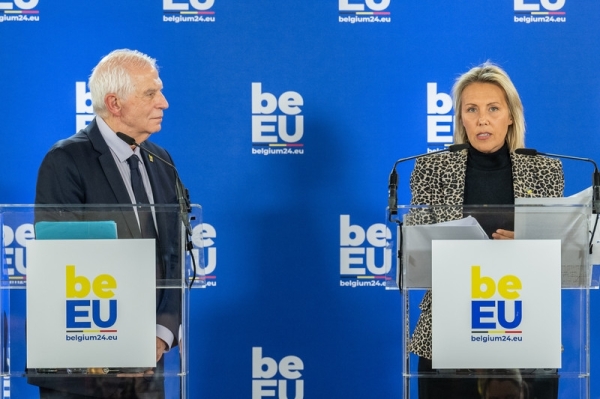EU’s Red Sea mission to be ‘purely defensive’, says Borrell
The EU’s Red Sea naval mission will be purely defensive, unlike the US-led one, Europe has said, amid concern the US and Iran are heading for a direct clash.
"Aspidus: It’s named after the ancient Greek word for shield. It’s shield to act in a purely defensive mode to defend merchant vessels ... it will not carry out any operations on land, only at sea," said EU foreign relations chief Josep Borrell in Brussels on Wednesday (31 January).
It will "not be participating in any kind of actions against the Houthis, only blocking the attacks of the Houthis to the [commercial] boats," he said.
Borrell spoke after informal talks with EU defence ministers, who discussed whether Greece, France, or Italy should lead the mission and who would take part.
"Not all member states will be willing to participate but no one will obstruct ... I hope that on the 17th of this month [February] the mission can be launched," he added.
France, Germany, and Italy have already each lined up a frigate to take part, while Belgian defence minister Ludivine Dedonder said on Wednesday that a Belgian frigate, the Louise-Marie, was "in principle" also free to join.
The Iran-backed Houthi rebel group in Yemen began firing at Western ships in the Red Sea last October in the name of solidarity with Palestinians in the Gaza war.
A more aggressive US-led naval task-force, Prosperity Guardian, launched air-strikes against Houthi bases in January together with British support.
An Iran-backed Iraq militia, Kataib Hezbollah, also killed three US soldiers at a base in Jordan on Sunday using a drone, raising the risk of regional escalation if the US hits back.
"We’re very worried about the situation," said German defence secretary Siemtje Möller in Brussels on Monday.
"We are concerned for our soldiers, but we also know they’re very capable of protecting themselves," she added, referring to German personnel at the US base in Jordan.
Amid Borrell’s emphasis on the reactive nature of Aspis, the Dutch foreign minister also said Europe was trying to play a calming role in the Middle East.
"Iran is delivering serious [military] capabilities to various terrorist groups in the region, so there’s a clear risk of escalation," she said in Monday.
"There’s a need to de-escalate also in the Red Sea," she said.
Speaking of the US options, Joshua Steinreich, a former Israeli intelligence officer, who now runs the Steinreich Communications consultancy firm in the US, said on Tuesday: "A US attack on Iranian assets in Syria would likely indicate to Iran that the US will not tolerate further provocations".
"It’s been widely reported that the US has encouraged Israel not to commit its forces to a full-scale war with Hezbollah [an Iran-backed militia in Lebanon] at this time, which the US could signal a change of position on," he added.

